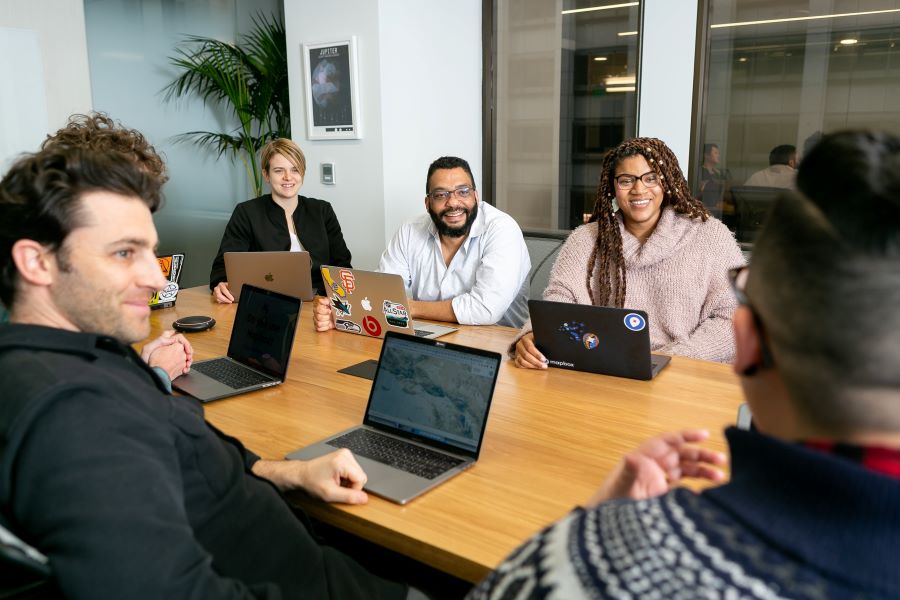Does your company have a joined up hiring strategy based on data and market intelligence? Did you know that your hiring strategy extends to your onboarding, culture, benefits, brand, business processes, priorities as well as your candidate attraction strategy.
Your hiring strategy matters more than you think. In a competitive jobs market, where every company is looking to hire the best talent, its imperative to consider market trends and make intelligent decisions. We all know that the right workforce can take a company to new heights, and in a difficult economy, businesses need to consider what factors could influence their hiring in 2024.
I’ve reviewed the top hiring trends emerging in 2024, condensing them into the 5 most significant insights to help your business thrive.
-
Hybrid model shows signs of decline
-
Gen Z are entering the workforce and making an impact
-
Reskilling workforces for generative AI and automation
-
The diversity, equity and inclusion gap may widen
-
Reputation matters so stay close to departed employees
Hybrid model shows signs of decline
While some trends following the pandemic have been fleeting, some trends look here to stay. According to Deloitte, UK hybrid working is three times higher than it was before the pandemic. But is everyone happy?
The jobs market has changed in the past year from a candidate-led to an employer-led market in many countries, as unemployment has risen and investment in new ventures has reduced. This means less job availability and more candidates looking for jobs, making it more competitive as a job seeker.
Many employees might think they prefer hybrid working, but it was reported in the Guardian that many remote workers put in longer hours while not being as productive with a drop in productivity varying between 4-19%. It’s also been reported that 80% of workers feel remote work harms their mental health. Saying that, parents and people with long commutes or social anxiety report remote working making them happier. Its not a one-size-fits-all!
Some employers are reassessing their remote working policies for 2024, to improve productivity and company culture. Some of the companies that made a U-turn on their remote working policies in 2023 include Starbucks, Amazon, Meta and IBM to name a few.
Gen Z are entering the workforce and making an impact
As some of Gen X start to retire and Millennials enter more senior, top level roles, it means Generation Z, (born 1997 - 2012), are having a bigger impact on growth in the workforce. Their influence can be seen as they inspire leaders to focus more on mental health, DEI, and a better sense of purpose, according to Forbes.
Research by the Edelman Trust Barometer reports that Gen Z have a ‘gravitational pull’ to influence those around them. They have a way of ensuring important conversations happen, which benefits organisations who want to increase their positive impact and engagement. Many Gen Zers are also looking for benefits like wellness programmes, gift cards, and retreats to attract them to companies.
Overall, my observation of working with the younger generation is their enthusiasm to learn, make a difference, and to do this they often seek mentorship. Many of Gen Z have a self-awareness of their skills and where they need to improve, so any business that can tap into this enthusiasm will find they retain their younger employees.
Reskilling workforces for generative AI and automation
A recent IBM report emphasised that almost half of C-suite executives believe approx. 40% of the global workforce will require reskilling and upskilling over the next three years – that’s 1.4 billion people. Businesses need to consider reskilling as a key business priority to quickly adjust to the technology changes ahead.
While AI and automation can’t fix a bad process (yet), its believed that more of the manual, repetitive tasks will be taken on by technology. This means redesigning some operations and processes, so that technology can take over and increase efficiency. This doesn’t mean replacing jobs, but more reskilling people to work on more complex tasks, or to oversee and develop the automation and AI itself.
It’s vital that employers engage their employees in these changes, for example, providing a forum where employees can suggest what they would like to automate. Removing manual, time-consuming tasks from a worker’s role, should free up their time to focus on the parts of their work that they feel more passionate about, while gaining more work-life balance.
Focusing on the recruitment industry itself, some of the key advances in 2024 are going to be CV matching using algorithms to identify the most relevant candidates for a role quickly, and predictive analytics where machine learning models predict a candidate’s success by analysing historical data.
With this comes the risk of bias; the EU AI Directive placed recruitment in the highest-risk category with not enough expertise to test the algorithms. A big example of hiring bias by AI was when Amazon had to scrap their AI hiring model when it realised it was hiring based on their previous hiring, which was male dominated; the AI was filtering out female applicants, adding to the gender gap.
While AI will continue to grow in popularity in 2024, so will the conversations around moderation and how to reduce discrimination.
The diversity, equity and inclusion gap may widen
2024 is set to continue to feel the effects of the tough economic conditions with business costs remaining high and the skills gaps increasing, as well as the polarising pollical stances across the world.
This could mean some businesses deprioritise their DEI efforts. A recent LinkedIn poll showed 40% of respondents felt there would be less investment into DEI, despite a variety of research showing the benefits of a more diverse and inclusive workforce. Elon Musk even posted recently that “DEI must DIE”, as a backlash in the US rises.
This reverse in business priorities could mean some companies struggle to attract the best talent to their business. A recent report showed that 80% candidates want to work for a company that values DEI issues, and 76% of employees said that diversity was important when considering job offers.
Having an internal DEI team is considered a luxury for some businesses, but the impact can be huge. I discussed some of the ways businesses can improve their own DEI with our own in-house expert, Jennine Gibbs. Here are her top 3 tips to improve DEI:
-
Evaluate your current DEI efforts – be led by the data, and interview your staff to understand the bigger picture, and how you need to improve.
-
Tailor your DEI training to your business – although generic training can create more awareness, if you want to change behaviours consider continuous learning and development programmes that relate to an individuals role.
-
Don’t have a team? Appoint someone to take ownership – Its important that you have an expert leading and advising your organisation. This person should be able to influence leadership, while implementing real change across the organisation.
DEI initiatives can help tackle the widening STEM skills gap by not only attracting candidates but also retaining them. Our recent article discusses how to adjust your interview process for neurodiverse candidates. By reviewing and adapting your hiring policies, procedures, and onboarding you can vastly widen your talent pool.
Reputation matters so stay close to departed employees
Social media and review channels are more important than ever when protecting your reputation and brand. It’s not just departed employees you need to consider, but also candidates that were unsuccessful in their application.
Dissatisfied candidates and employees can write or even record reviews that may have a negative impact – TikTok has seen a big rise in these types of reviews. Often the best approach is prevention, so if you can gain feedback in exit interviews, and ensure departing employees are listened to, it can make a big difference. You can gain valuable insights, make improvements, and improve retention.
Prioritising the candidate experience and ensuring clear, timely communication can have a big impact too. If you do receive negative feedback, you can assess its validity, and if needed, contact the person directly to address their issues.
Need hiring advice in 2024
Your workforce is your most valuable asset. They are the life-blood of your organisation. If you want to shake things up and upgrade your hiring strategy this year, contact me for a no obligation consultation.
We work across niche areas in technology, insurance, and banking, with a vast professional community, that we regularly engage with. We look forward to working with you!
About the author
Jo Callaghan, UK Country Director has worked with Gravitas for over 11 years (+17 years in recruitment). Her passion for people and recruitment shines through as she strongly believes in its transformative power to change lives. Jo works across our Manchester, London and Leeds offices, implementing and influencing the company’s strategy, while developing our office leaders.

